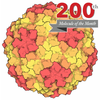[English] 日本語
 Yorodumi
Yorodumi- PDB-8bqn: Structure of empty Coxsackievirus A10 embedded in crystalline ice... -
+ Open data
Open data
- Basic information
Basic information
| Entry | Database: PDB / ID: 8bqn | ||||||
|---|---|---|---|---|---|---|---|
| Title | Structure of empty Coxsackievirus A10 embedded in crystalline ice frozen at -140 degree | ||||||
 Components Components |
| ||||||
 Keywords Keywords | VIRUS / Coxsackievirus A10 / empty Coxsackievirus A10 / crystalline ice | ||||||
| Function / homology |  Function and homology information Function and homology informationsymbiont-mediated suppression of host cytoplasmic pattern recognition receptor signaling pathway via inhibition of MDA-5 activity / picornain 2A / symbiont-mediated suppression of host mRNA export from nucleus / symbiont genome entry into host cell via pore formation in plasma membrane / picornain 3C / T=pseudo3 icosahedral viral capsid / ribonucleoside triphosphate phosphatase activity / host cell cytoplasmic vesicle membrane / nucleoside-triphosphate phosphatase / channel activity ...symbiont-mediated suppression of host cytoplasmic pattern recognition receptor signaling pathway via inhibition of MDA-5 activity / picornain 2A / symbiont-mediated suppression of host mRNA export from nucleus / symbiont genome entry into host cell via pore formation in plasma membrane / picornain 3C / T=pseudo3 icosahedral viral capsid / ribonucleoside triphosphate phosphatase activity / host cell cytoplasmic vesicle membrane / nucleoside-triphosphate phosphatase / channel activity / monoatomic ion transmembrane transport / DNA replication / RNA helicase activity / endocytosis involved in viral entry into host cell / symbiont-mediated activation of host autophagy / RNA-directed RNA polymerase / cysteine-type endopeptidase activity / viral RNA genome replication / RNA-directed RNA polymerase activity / DNA-templated transcription / virion attachment to host cell / host cell nucleus / structural molecule activity / proteolysis / RNA binding / zinc ion binding / ATP binding / membrane Similarity search - Function | ||||||
| Biological species |   Coxsackievirus A10 Coxsackievirus A10 | ||||||
| Method | ELECTRON MICROSCOPY / single particle reconstruction / Resolution: 3.1 Å | ||||||
 Authors Authors | Shi, H. / Wu, C. / Zhang, X. | ||||||
| Funding support |  China, 1items China, 1items
| ||||||
 Citation Citation |  Journal: Structure / Year: 2023 Journal: Structure / Year: 2023Title: Addressing compressive deformation of proteins embedded in crystalline ice. Authors: Huigang Shi / Chunling Wu / Xinzheng Zhang /  Abstract: For cryoelectron microscopy (cryo-EM), high cooling rates have been required for preparation of protein samples to vitrify the surrounding water and avoid formation of damaging crystalline ice. ...For cryoelectron microscopy (cryo-EM), high cooling rates have been required for preparation of protein samples to vitrify the surrounding water and avoid formation of damaging crystalline ice. Whether and how crystalline ice affects single-particle cryo-EM is still unclear. Here, single-particle cryo-EM was used to analyze three-dimensional structures of various proteins and viruses embedded in crystalline ice formed at various cooling rates. Low cooling rates led to shrinkage deformation and density distortions on samples having loose structures. Higher cooling rates reduced deformations. Deformation-free proteins in crystalline ice were obtained by modifying the freezing conditions, and reconstructions from these samples revealed a marked improvement over vitreous ice. This procedure also increased the efficiency of cryo-EM structure determinations and was essential for high-resolution reconstructions. | ||||||
| History |
|
- Structure visualization
Structure visualization
| Structure viewer | Molecule:  Molmil Molmil Jmol/JSmol Jmol/JSmol |
|---|
- Downloads & links
Downloads & links
- Download
Download
| PDBx/mmCIF format |  8bqn.cif.gz 8bqn.cif.gz | 138.2 KB | Display |  PDBx/mmCIF format PDBx/mmCIF format |
|---|---|---|---|---|
| PDB format |  pdb8bqn.ent.gz pdb8bqn.ent.gz | 105.4 KB | Display |  PDB format PDB format |
| PDBx/mmJSON format |  8bqn.json.gz 8bqn.json.gz | Tree view |  PDBx/mmJSON format PDBx/mmJSON format | |
| Others |  Other downloads Other downloads |
-Validation report
| Arichive directory |  https://data.pdbj.org/pub/pdb/validation_reports/bq/8bqn https://data.pdbj.org/pub/pdb/validation_reports/bq/8bqn ftp://data.pdbj.org/pub/pdb/validation_reports/bq/8bqn ftp://data.pdbj.org/pub/pdb/validation_reports/bq/8bqn | HTTPS FTP |
|---|
-Related structure data
| Related structure data |  28627MC 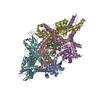 8ew0C 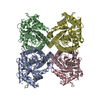 8ew2C 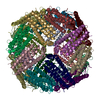 8f49C 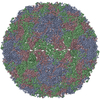 8f7yC 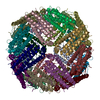 8hhsC  8hi2C M: map data used to model this data C: citing same article ( |
|---|---|
| Similar structure data | Similarity search - Function & homology  F&H Search F&H Search |
- Links
Links
- Assembly
Assembly
| Deposited unit | 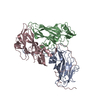
|
|---|---|
| 1 | x 60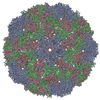
|
| 2 |
|
| 3 | x 5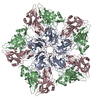
|
| 4 | x 6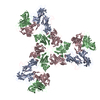
|
| 5 | 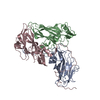
|
| Symmetry | Point symmetry: (Schoenflies symbol: I (icosahedral)) |
- Components
Components
| #1: Protein | Mass: 33204.332 Da / Num. of mol.: 1 / Source method: isolated from a natural source / Source: (natural)   Coxsackievirus A10 / References: UniProt: G0YPI2 Coxsackievirus A10 / References: UniProt: G0YPI2 |
|---|---|
| #2: Protein | Mass: 27783.105 Da / Num. of mol.: 1 / Source method: isolated from a natural source / Source: (natural)   Coxsackievirus A10 / References: UniProt: G0YPI2 Coxsackievirus A10 / References: UniProt: G0YPI2 |
| #3: Protein | Mass: 26187.623 Da / Num. of mol.: 1 / Source method: isolated from a natural source / Source: (natural)   Coxsackievirus A10 / References: UniProt: G0YPI2 Coxsackievirus A10 / References: UniProt: G0YPI2 |
| Has protein modification | N |
-Experimental details
-Experiment
| Experiment | Method: ELECTRON MICROSCOPY |
|---|---|
| EM experiment | Aggregation state: PARTICLE / 3D reconstruction method: single particle reconstruction |
- Sample preparation
Sample preparation
| Component | Name: Coxsackievirus A10 / Type: VIRUS / Entity ID: all / Source: NATURAL |
|---|---|
| Source (natural) | Organism:   Coxsackievirus A10 Coxsackievirus A10 |
| Details of virus | Empty: YES / Enveloped: NO / Isolate: SUBSPECIES / Type: VIRUS-LIKE PARTICLE |
| Buffer solution | pH: 6.8 |
| Specimen | Embedding applied: NO / Shadowing applied: NO / Staining applied: NO / Vitrification applied: NO |
- Electron microscopy imaging
Electron microscopy imaging
| Experimental equipment |  Model: Titan Krios / Image courtesy: FEI Company |
|---|---|
| Microscopy | Model: FEI TITAN KRIOS |
| Electron gun | Electron source:  FIELD EMISSION GUN / Accelerating voltage: 300 kV / Illumination mode: FLOOD BEAM FIELD EMISSION GUN / Accelerating voltage: 300 kV / Illumination mode: FLOOD BEAM |
| Electron lens | Mode: BRIGHT FIELD / Nominal defocus max: 2500 nm / Nominal defocus min: 500 nm |
| Image recording | Electron dose: 60 e/Å2 / Film or detector model: GATAN K2 SUMMIT (4k x 4k) |
- Processing
Processing
| Software | Name: PHENIX / Version: 1.20_4459: / Classification: refinement | ||||||||||||||||||||||||
|---|---|---|---|---|---|---|---|---|---|---|---|---|---|---|---|---|---|---|---|---|---|---|---|---|---|
| EM software | Name: PHENIX / Category: model refinement | ||||||||||||||||||||||||
| CTF correction | Type: PHASE FLIPPING AND AMPLITUDE CORRECTION | ||||||||||||||||||||||||
| 3D reconstruction | Resolution: 3.1 Å / Resolution method: FSC 0.143 CUT-OFF / Num. of particles: 7945 / Algorithm: BACK PROJECTION / Symmetry type: POINT | ||||||||||||||||||||||||
| Refinement | Highest resolution: 3.1 Å | ||||||||||||||||||||||||
| Refine LS restraints |
|
 Movie
Movie Controller
Controller








 PDBj
PDBj
